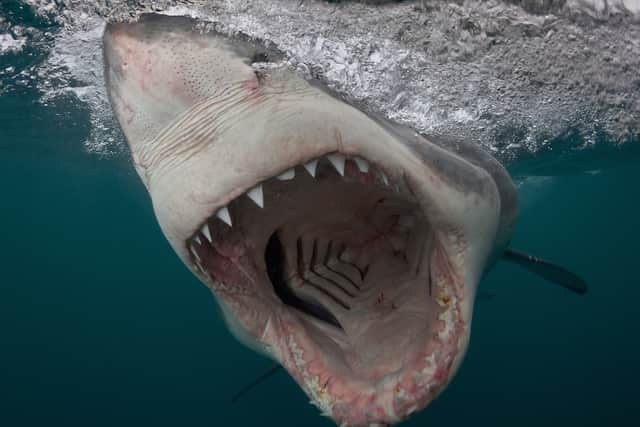Shark bites: Fatal attacks 'doubled in 2023' - here's what experts say you should do to keep yourself safe
and live on Freeview channel 276
Fatal shark attacks doubled over the last 12 months and unprovoked attacks were above the most recent average, but experts say it remains extremely unlikely beachgoers will be bitten.
A new report released on Monday (5 February) by the University of Florida’s International Shark Attack File recorded ten fatal attacks in 2023 - up from five in 2022 - with a "disproportionate" number taking place in Australia. But researchers have also noted an "unnerving" overall increase in unprovoked shark attacks worldwide - including bites by great whites.
Advertisement
Hide AdAdvertisement
Hide AdBut the research team believe the pattern isn’t due to sharks behaving more aggressively. Instead, they believe it is a combination of more people swimming, surfing, and spending time in their ocean homes each year - and a stronger emphasis placed on reporting bites and fatalities.
The global shark attacks confirmed a total of 69 unprovoked bites - defined as incidents where a shark is in its natural habitat and attacks without any human provocation - last year. The number was higher than the most recent five-year average of 63 attacks, but experts said it was still consistent with long-term trends.


Australia accounted for 22% of all attacks in 2023, and 40% of fatalities. The United States had 36 unprovoked attacks (52% of the worldwide total) and two confirmed deaths - one in Hawaii and one in California. As in previous years, Florida had more shark attacks than any other state, with 16.
The Bahamas, Egypt, Mexico and New Caledonia had one fatality each. Other confirmed, non-fatal bites occurred in Costa Rica, Colombia, Brazil, New Zealand, Seychelles, Turks and Caicos, the Galápagos Islands and South Africa.
Advertisement
Hide AdAdvertisement
Hide AdThe report also noted an additional 22 attacks last year, that were intentionally or unintentionally provoked. The most common activity at the time of these attacks was spearfishing.
Dr Gavin Naylor, director of the Florida Museum of Natural History’s shark research programme, told SWNS: “This is within the range of the normal number of bites, though the fatalities are a bit unnerving this year."
The report found that the vast majority of unprovoked attacks were so-called "test bites" - where a shark misidentified a human as their preferred prey and took a single bite, usually swimming away when they realise. However one of the fatal attacks, involving a tiger shark off the banks of the Red Sea in Egypt, stood out as an extremely rare predation incident, with video showing the shark taking multiple passes at a human in the water.
Three of last year's fatalities were centred around South Australia's Eyre Peninsula, a particularly popular surfing destination home to a number of remote beaches. However, the region is also home to many seal colonies - and a high density of great white sharks as a result.
Advertisement
Hide AdAdvertisement
Hide Ad“If a white shark is going after a seal and the seal knows it, the white shark hasn’t got a chance," Dr Naylor said. “Seals are really agile, so the only ones that get caught are the ones that are goofing off and flopping around on the surface minding their own business. And that’s kind of what a surfer looks like.”
Sharing the sea with sharks safely
Surfers were the victims of 42% of shark bites worldwide last year, with swimmers and waders second at 39%. Luckily, the experts said there was plenty beachgoers could do to help keep themselves safe.
Joe Miguez, a doctoral student in the Florida Programme for Shark Research, said that if you go to remote regions where beach safety are not in place, there is a higher risk of dying. "This is because when an attack happens and there is beach safety, you can get a tourniquet on sooner and save the person's life. So, the solution isn’t to not surf. It’s to surf in areas where there's a good beach safety programme in place.”
Despite the increase, the researchers said that the number of bites and fatalities were still within the average for the last decade. Each year, there are consistently fewer than 100 unprovoked bites, making it more likely for someone to win the lottery than to be attacked by a shark.
Advertisement
Hide AdAdvertisement
Hide AdMost shark attacks occur during the summer months, when both sharks are more active and people spend more time in the water. “It causes a lot of fear, but the reality is you’re putting a lot of people in the water on a hot day with bait fish in the water," Dr Naylor added.
He said the odds of being bitten remained "incredibly" low, but recommended bathers stay close to shore, not swim at dawn or dusk, and avoid excessive splashing, all of which will help keep them them away from the places and times sharks are most active - and help avoid them being misidentified as prey.
There are very few shark bites or attacks in British waters, despite them being home to more than 40 different species. However, experts say the changing climate and warming seas is driving new, larger species to our seas - like the 15-foot smalltooth sand tiger shark - with which we will need to learn to coexist safely.
Comment Guidelines
National World encourages reader discussion on our stories. User feedback, insights and back-and-forth exchanges add a rich layer of context to reporting. Please review our Community Guidelines before commenting.
